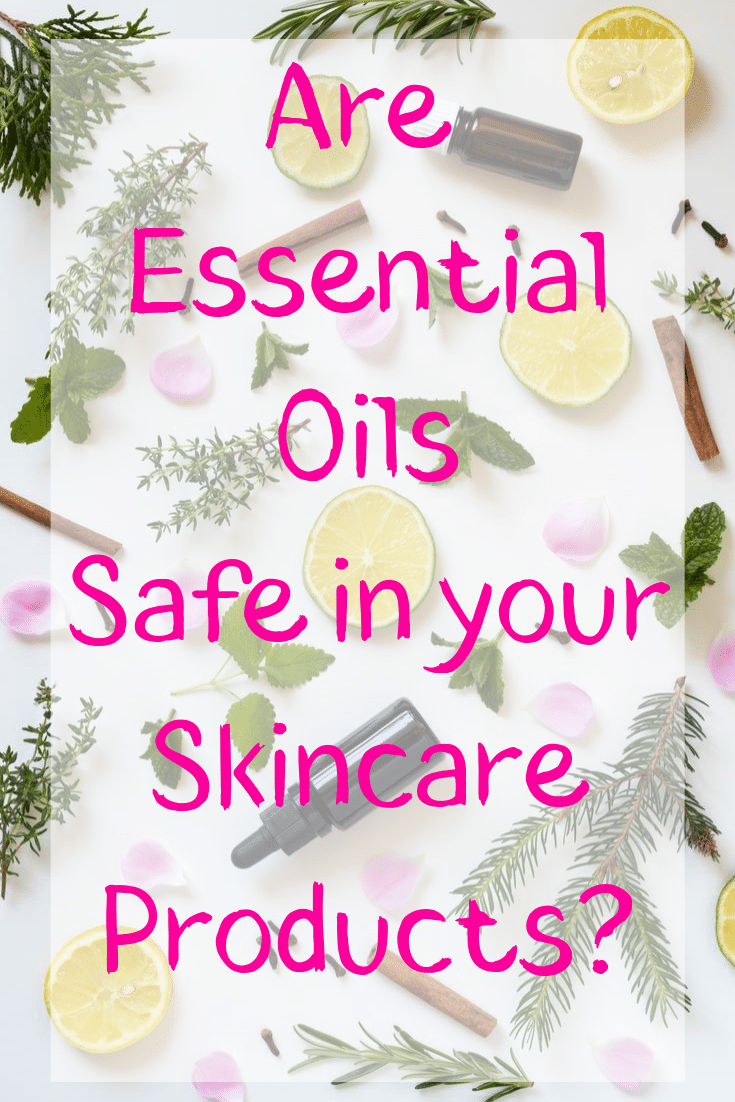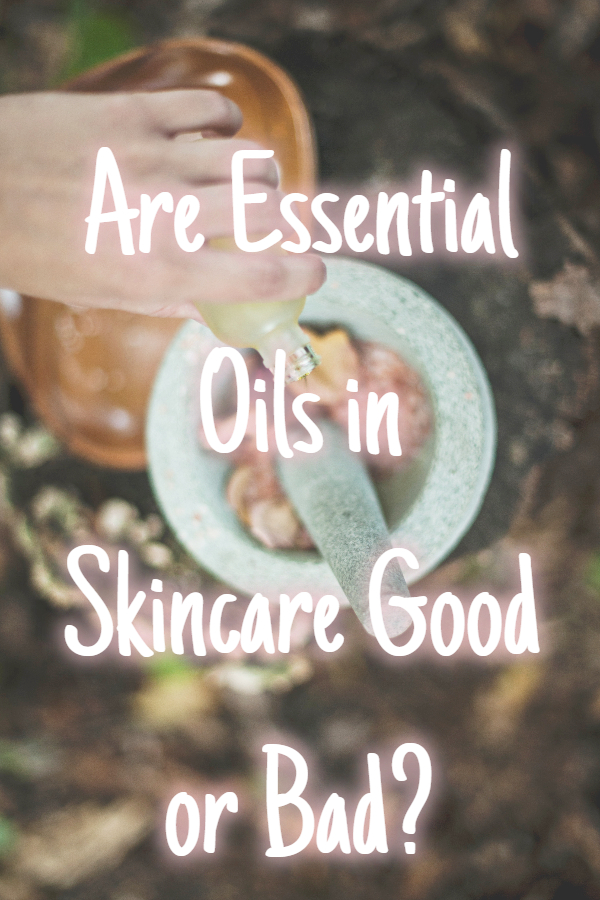
The “all-natural” movement has been gaining popularity in the skincare market. It has caused a tremendous boom in brands formulating essential oils into their skincare products so that attractive buzzwords like lavender oil or mint oil can be featured on the label. But are essential oils in skincare safe?
Are Essential Oils in Skincare Safe?
Just because an ingredient is natural doesn’t necessarily mean it is safe to include in your daily skincare regime!
This post contains affiliate links; if you snag a product through my link it will send some spare change my way to keep this slice of the internet up and running.
Direct exposure to some essential oils can cause severe irritation and even contact dermatitis (source). There are only a few essential oils that can be applied to the skin undiluted. Tea tree oil is one of the only oils I use for skincare purposes because its antimicrobial and anti-inflammatory properties are very effective in zapping spots and blemishes away.
Essential oils in skincare can cause major irritation for sensitive skin types. A highly diluted mixture may not cause a reaction right away, but if multiple products with oils are combined into one skincare routine they can spell out trouble for your skin.
Skin is also insanely talented at hiding when it’s feeling irritated! It may not show a reaction right away but you can actually build sensitivity to fragrance after repeated use of a scented product. (source)
It’s a good idea to avoid unnecessary fragrance in skincare so that you don’t develop a sensitivity down the road. There are quite a few brands that are either going 100% fragrance-free or developing fragrance-free products for this specific reason. Drunk Elephant is one of the biggest names in the fragrance-free game and I fully agree with this quote from the founder:
A routine is only as good as its worst product, a product only as good as its worst ingredient. It takes just one bad guy to ruin the party.
Tiffany Masterson

What exactly is an essential oil?
Essential oils are the volatile essences of plants that have been distilled into a highly concentrated oil. They can be sourced from many different parts of the plant. For instance, rose oil is obtained from rose petals while orange and lemon are sourced from refining their peels.
What essential oils are safe for your skin?
These are some of the oils I personally use in my skincare routine. I have a normal leaning towards combination skin type so these oils may be too aggressive for sensitive skin.
Tea tree oil is great for healing fungal acne and all blemishes general but it is very potent. I recommend diluting it in a carrier oil like moringa oil or jojoba oil before use. Add 1-2 drops of essential oil to 3 tablespoons of your carrier oil. After a few days use you can ramp up the amount of tea tree oil if your skin is reacting well to the mix of oils. But if you are already seeing results with the first mixture just stick with it. If it’s not broke don’t fix it!
- Tea Tree Oil- this is helpful for clearing acne breakouts. Here’s my go-to brand.
- Rose Otto Essential Oil – this oil helps dryness and is a natural astringent + an anti-inflammatory! (sources 1, 2, 3.) This is my favorite brand.
Do essential oils cause acne breakouts?
Even when diluted, essential oils in skincare can cause breakouts or reactions with any skin type. Essential oils are extremely powerful and can easily overwhelm sensitive or acne-prone skin.
This is why it’s extremely important to dilute your essential oils before use. Always start with a very low concentration, you can always ramp it up if your skin is not showing signs of irritation. Start off by adding 1-2 drops of essential oil to 3 tablespoons of your carrier oil.
Essential oils can also cause “sensitized” skin which shouldn’t be confused with sensitive skin. Your skin can become sensitized after being repeatedly exposed to aggravating ingredients like fragrant oils. (source)
What are the benefits of essential oils in skincare?
Essential oils differ from enriching oils like jojoba, carrot seed, rosehip, and avocado oil. Seed/vegetable sourced oils are rich in skin-benefiting fatty acids, vitamins, and minerals while essential oils are usually pure fragrance. Essential oils are distilled through an extraction process that leaves behind all of the potential fatty acids and minerals of the original plant.
Oils like rosehip oil and carrot seed oil have substantial benefits when applied to the skin but when you get right down to it, essential oils are almost always just thrown in as a fragrance. If you want to incorporate the awesomeness that is rosehip oil in your skin routine I recommend this oil by InstaNatural. It’s chock full of Vitamin A and helps fight signs of aging.
Citrus derived essential oils in skincare should be used with caution.
Citrus oils (including orange, lime, lemon, grapefruit, and bergamot) have an added risk: they can cause photosensitization, meaning they react with the sun to cause phototoxic burns. Other essential oils that can cause photosensitivity include:
- Angelica Root (Angelica archangelica)
- Bergamot (Citrus bergamia, Citrus aurantium)
- Grapefruit (Citrus x paradisi)
- Lemon – cold pressed (Citrus x limon, Citrus limonum)
- Lime – cold pressed (Citrus x aurantifolia, Citrus x latifolia)
- Mandarin Leaf (Citrus reticulata, Citrus nobilis)
- Orange, Bitter (Citrus x aurantium)
- Rue (Ruta graveolens, Ruta montana) (source)
“Phototoxic essential oils include bergamot [and citruses, like] lime and lemon, that should not be used at more than 0.5 percent on skin exposed to any amount of sunlight.”
Robert Tisserand

Distilled vs. Cold Pressed Essential Oils
MadHippie.com explains: “Steam-distilled and cold-pressed citrus oils are very different both in their creation and in the composition of the final product. The photosensitizing component found in the peel, bergapten, and sometimes present in cold-pressed citrus oils, cannot pass through the steam distillation process as it is too large, meaning that while some cold-pressed citrus oils should not be used prior to sun exposure, their steam distilled counterparts are not a worry, particularly in the very low concentrations used in skincare products, often around the 0.01 – 0.1% range.” (Source)
I personally don’t use citrus oils because the risk seems to greatly outweigh the potential benefits. Supposedly citrus oils can help even skin tone by lightening dark spots and controlling excess oil. I would rather use my trusty Vitamin C serum instead of risking sun damage. If you need help picking the right serum for your skin type you can check out my handy dandy serum guide here. And as always, no matter what products you are using, don’t forget to slather on some SPF before heading out the door!
If you have a serum or moisturizer with citrus oils that you can’t stand the thought of tossing, just move it into your nightly skincare routine! I’ve received a ton of citrus-infused skincare from my monthly Korean skincare subscription boxes that I always make sure to keep in the PM end of my daily routine.
What are your thoughts on using essential oils in skincare? Yay or nay?

Recent Posts
There are two new sunscreens on the block and the lovely folks over at Kinfield gifted some tubes for me to to test out so I can share a skincare deep dive with y'all! This post contains affiliate...
Trying to find a sunscreen formulated without glycerin is no easy task! I've researched hundreds of sunscreen formulas while writing for this blog and it's shocking how extremely few glycerin-free...
